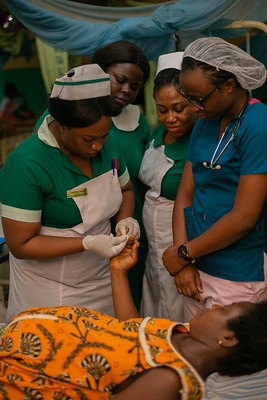
Jenifer Adjei, midwife-in-charge at the Oda Regional Hospital, showing colleagues how to conduct a rapid diagnostic test for malaria. Photo Credit: Emmanuel Attramah, Impact Malaria
The miracle of birth and the making of mothers has long fascinated Jenifer Adjei. Now an accomplished midwife at the Oda Government Hospital in Ghana, Jenifer helps expectant and new parents plan for and adjust to the arrival of their babies.
Unfortunately Jenifer has become all too familiar with the adverse effects of malaria in Ghana, as sometimes her patients are women who become infected during their pregnancies. Malaria during pregnancy increases the risk of illness and death for both the mother and her child.
Ghana has made substantial gains in driving down malaria: In 2010, about 1 out of every five deaths were attributed to malaria, and by 2018 it had fallen to about 1 out of every 65 deaths. The disease, however, still kills far too many Ghanaians.
Reports from health facilities indicate that too few health workers are following international guidelines for testing and treatment of malaria, which require patients to test positive for malaria before receiving medicine. Jenifer recounts times at the hospital where patients with fevers were treated with antimalarials without first having a test. This practice wastes medicine, increases the risk of drug resistance, and can make it difficult to properly track cases of malaria.
To improve care and treatment of malaria, the U.S. President’s Malaria Initiative (PMI) has supported Ghana’s National Malaria Control Program in organizing facility-based malaria case management trainings for health workers. The curriculum includes the treatment of severe and uncomplicated malaria and malaria during pregnancy.
During the training, Jenifer and her team identified non-testing of uncomplicated malaria before treatment as a challenge—with as many as three out of five people suspected to have uncomplicated malaria cases not being tested before treatment. A few months after the training, this practice had dropped to zero.
Jenifer is just one of more than 1,200 health workers in 37 high-burden health facilities across Ghana who have benefitted from the malaria case management training. Across all 27 countries in fiscal year 2019, PMI trained 31,059 health workers in malaria diagnosis and 39,297 in clinical care.
Today, every patient at Oda Government Hospital who shows signs of malaria is tested – either with a rapid diagnostic test or by having their blood examined through a microscope.
Jenifer has observed that testing before treatment significantly reduces wait times and pressure on health facilities.
“It’s also improving the quality of care and our antimalarial medicines are now used rationally,’’ she said.
